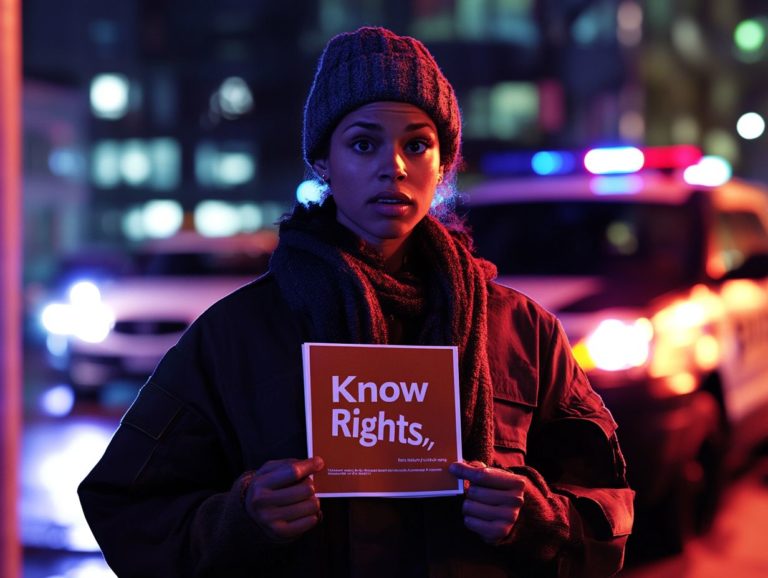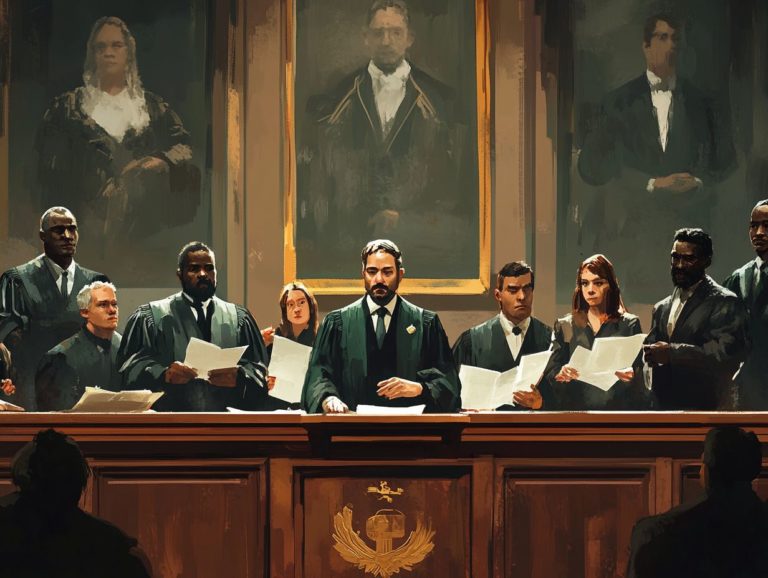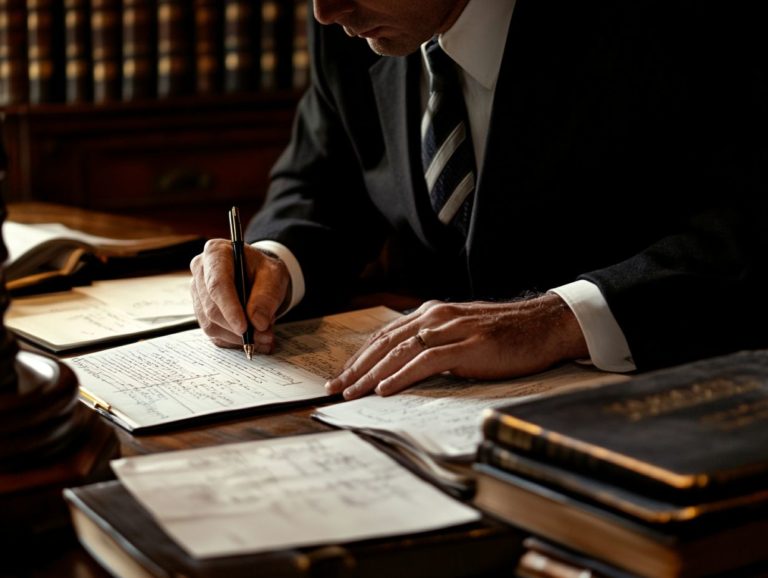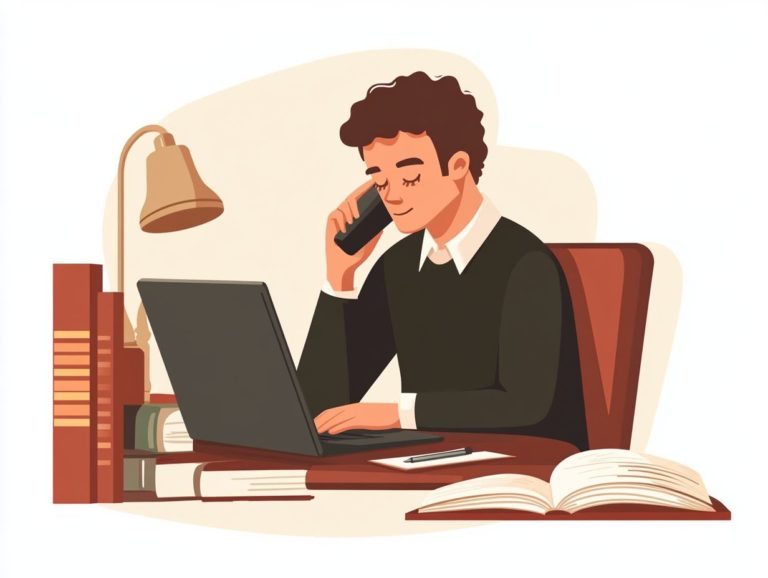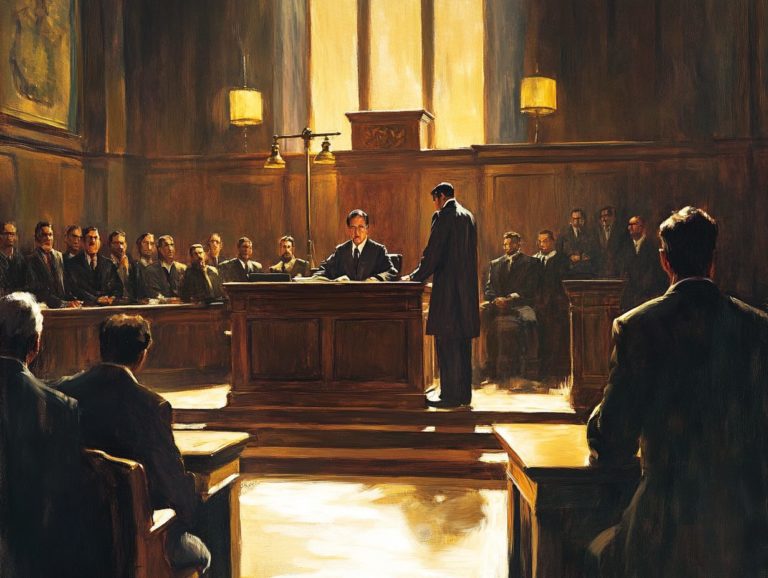What to Expect During a Criminal Trial?
Get ready to dive into the world of criminal trials! Understanding this process can empower you as a witness or victim.
This article breaks down the entire process, from the definition and purpose of a trial to the key players involved and their specific roles.
You ll discover each step, from arrest to verdict, and gain insights into the critical importance of evidence.
You ll explore potential outcomes and what to expect if called to testify. Let s unlock the secrets of criminal trials together and empower your understanding!
Contents
Key Takeaways:
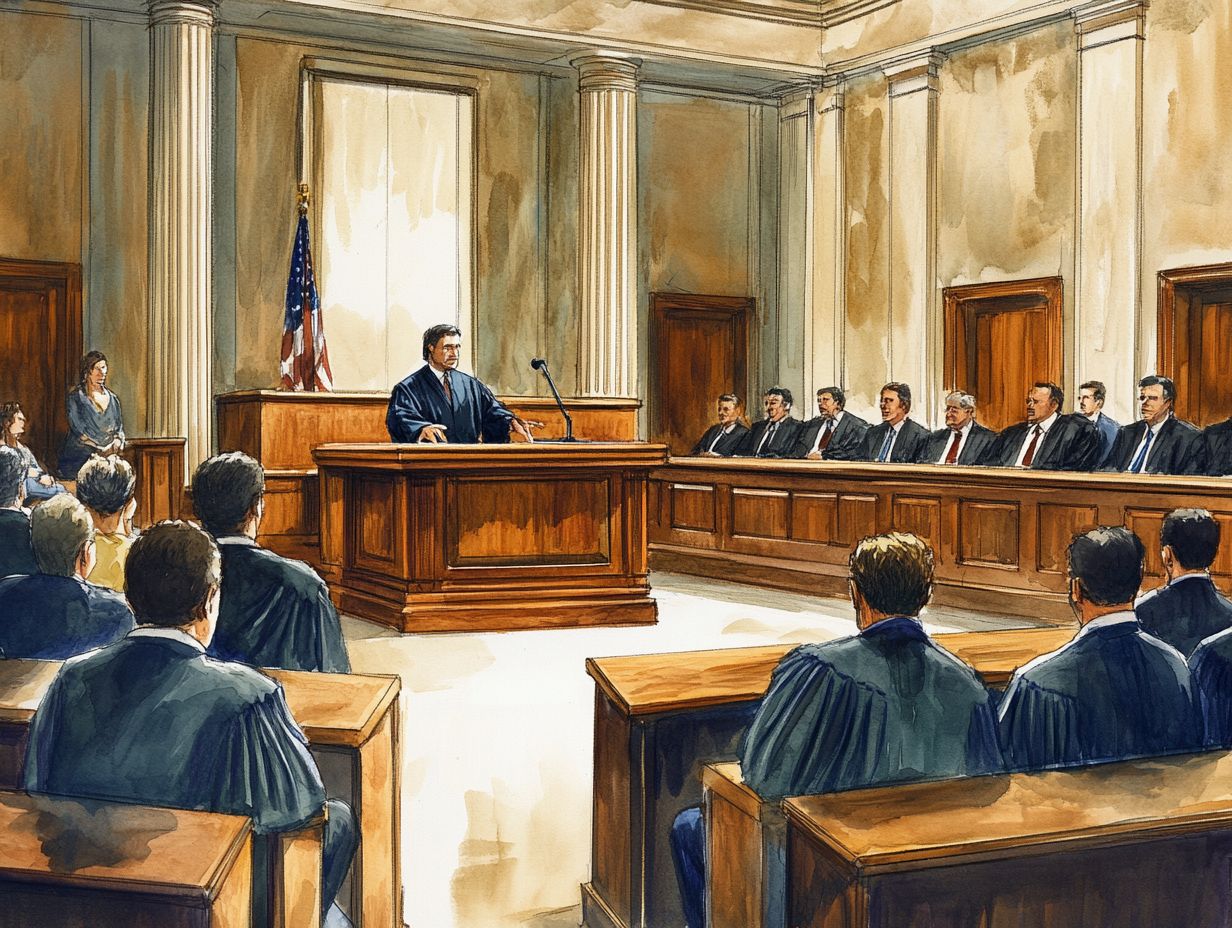
A criminal trial is your chance for justice, determining if the accused is guilty or innocent.
Key players include the judge, who maintains order, and the jury, who decides the verdict.
The prosecution represents the state s interests and works to demonstrate the defendant’s guilt.
The defense attorney advocates for the accused, ensuring their rights are protected.
Strong evidence is crucial, as it can greatly impact the trial’s outcome.
Overview of a Criminal Trial
A criminal trial represents a formal judicial proceeding where an individual accused of a crime, known as the defendant, faces a jury or a judge.
This process aims to establish the guilt or innocence of the accused, relying on evidence presented by both the prosecution and the defense.
The trial safeguards the rights of the defendant, balancing the interests of justice and societal protection. This balance is vital within the criminal justice system in the United States, especially in jurisdictions such as Arizona.
Definition and Purpose
A criminal trial is a judicial proceeding where you stand before a court to determine your guilt or innocence concerning specific charges. This essential process upholds justice principles and ensures your individual rights are protected throughout legal proceedings.
By adhering to established protocols and maintaining procedural integrity, the trial serves as a stage for both sides to present their arguments. It fosters public confidence in the legal system, allowing for a thorough examination of evidence, witness testimonies, and legal arguments.
Ultimately, the foundation of any criminal trial rests on its commitment to fairness, ensuring that you and all parties involved receive an equitable trial under the law.
Key Players in a Criminal Trial
In a criminal trial, several key players each play vital roles:
- The prosecution, representing the state s interests, works to demonstrate the defendant’s guilt;
- The defense attorney, who advocates for the accused, ensuring their rights are protected;
- The judge, who maintains order and ensures the law is upheld;
- The jury, tasked with evaluating the evidence and deciding the verdict;
- Various witnesses, whose testimonies and evidence help illuminate the case.
Roles and Responsibilities
The prosecution must prove the defendant’s guilt, while the defense attorney focuses on establishing reasonable doubt and safeguarding the accused’s rights.
The judge plays a crucial role in overseeing the proceedings, ensuring the trial adheres to legal standards while allowing both sides to present their cases effectively.
Witness testimony stands as a cornerstone of the trial and can dramatically influence the jury s perception. Each participant presents arguments, striving to sway opinions in their favor.
Ultimately, the jury carries the weighty responsibility of deliberation. They review the evidence and testimonies to arrive at a fair verdict, grounded in the facts presented throughout the trial.
Now that you understand the basics, you can navigate this process with confidence!
Steps in a Criminal Trial
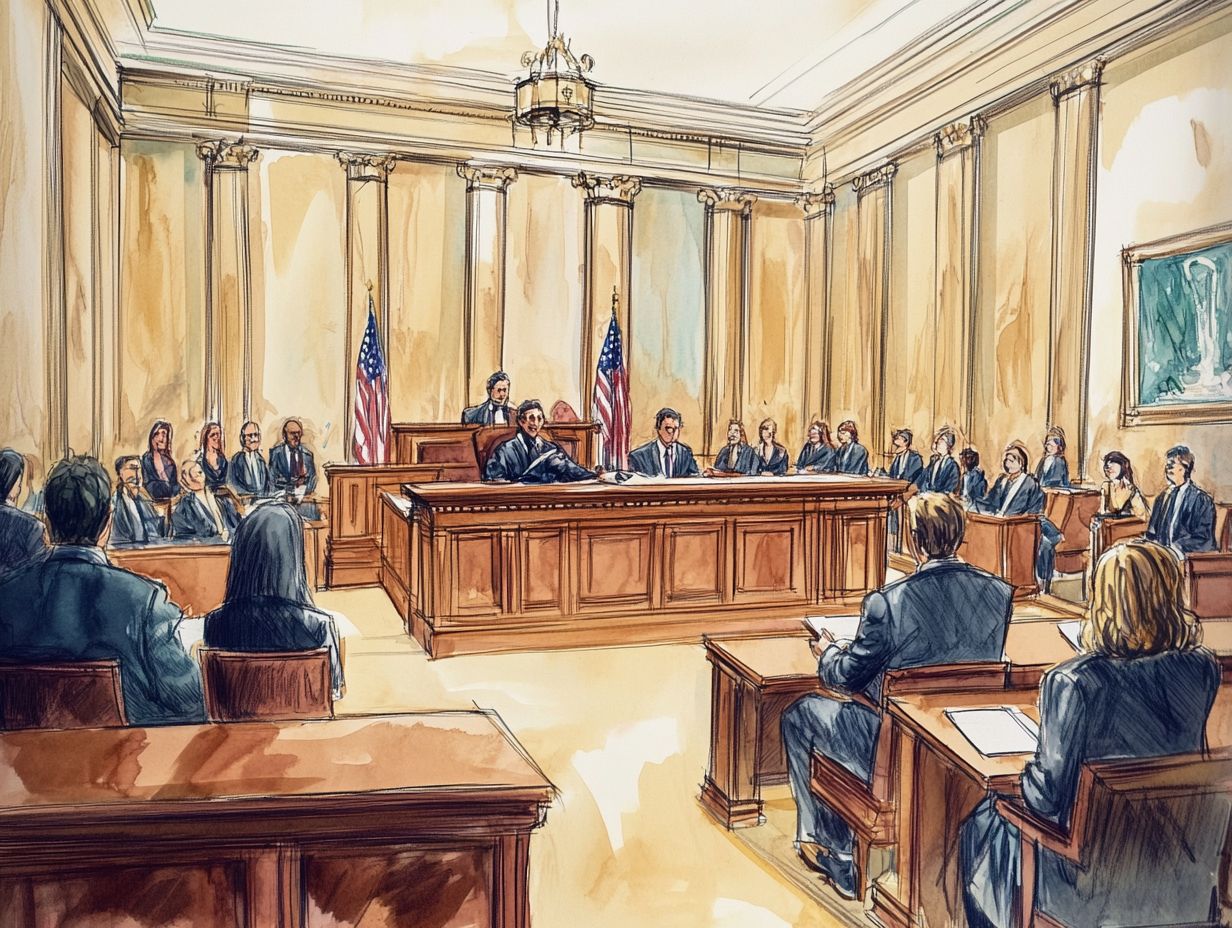
The journey of a criminal trial unfolds through several pivotal steps. It all starts with your arrest, a critical moment that changes everything, setting the stage for what follows: the arraignment.
The arraignment is your first court appearance where you hear the charges against you and enter a plea. Next, a series of pre-trial motions occur that shape the proceedings.
Jury selection is conducted, carefully assembling a panel to hear the case. The trial then kicks off with opening statements, leading into the presentation of evidence and compelling witness testimonies.
As the trial nears its conclusion, closing arguments are made, ending with the jury’s decision and possible sentencing. Every step matters in the quest for justice.
From Arrest to Verdict
The journey from arrest to verdict in a criminal trial is complex and structured. It is meticulously designed to ensure fairness and justice for you, the defendant.
Your arrest marks the beginning, where law enforcement gathers initial evidence and takes you into custody. Following that, the arraignment sets the stage for what lies ahead.
Pre-trial motions occur before the trial begins to resolve any issues, ensuring that both sides have a clear understanding of the evidence to be presented. During the trial, the jury plays a crucial role, carefully listening to the evidence from both the prosecution and defense.
Finally, the verdict announcement serves as the culmination of this intricate process. It determines your fate and reflects the integrity of the judicial system as a whole.
The Importance of Evidence
Evidence holds a crucial position in a criminal trial. It serves as the foundation upon which the determination of guilt or innocence is built throughout the trial process.
Types of Evidence and Their Impact
In a criminal trial, the types of evidence you encounter can vary widely. This includes physical evidence, documents, witness statements, and expert testimony. Each of these elements plays a unique role in influencing the trial’s outcome.
For instance, consider physical evidence like fingerprints or DNA; it can be incredibly compelling, often establishing a direct connection between you, the defendant, and the crime scene. Documents such as emails or financial records can reveal intentions or plans, shedding light on your state of mind.
Witness statements can sway the jury, but it’s crucial to scrutinize them for reliability and potential biases. Expert testimony especially from forensic specialists introduces authority by interpreting complex evidence, though its admissibility depends on the expert’s qualifications and methodologies employed.
Ultimately, the interplay of these diverse types of evidence shapes not just legal arguments but also the jury’s overall perception of guilt or innocence.
Possible Outcomes of a Criminal Trial
The possible outcomes of a criminal trial rest on the jury’s verdict. This may conclude with a finding of guilty or not guilty. Each outcome brings distinct implications for sentencing and potential future legal actions, such as appeals.
Understanding these nuances is crucial as they can significantly influence your legal journey moving forward.
Guilty vs. Not Guilty
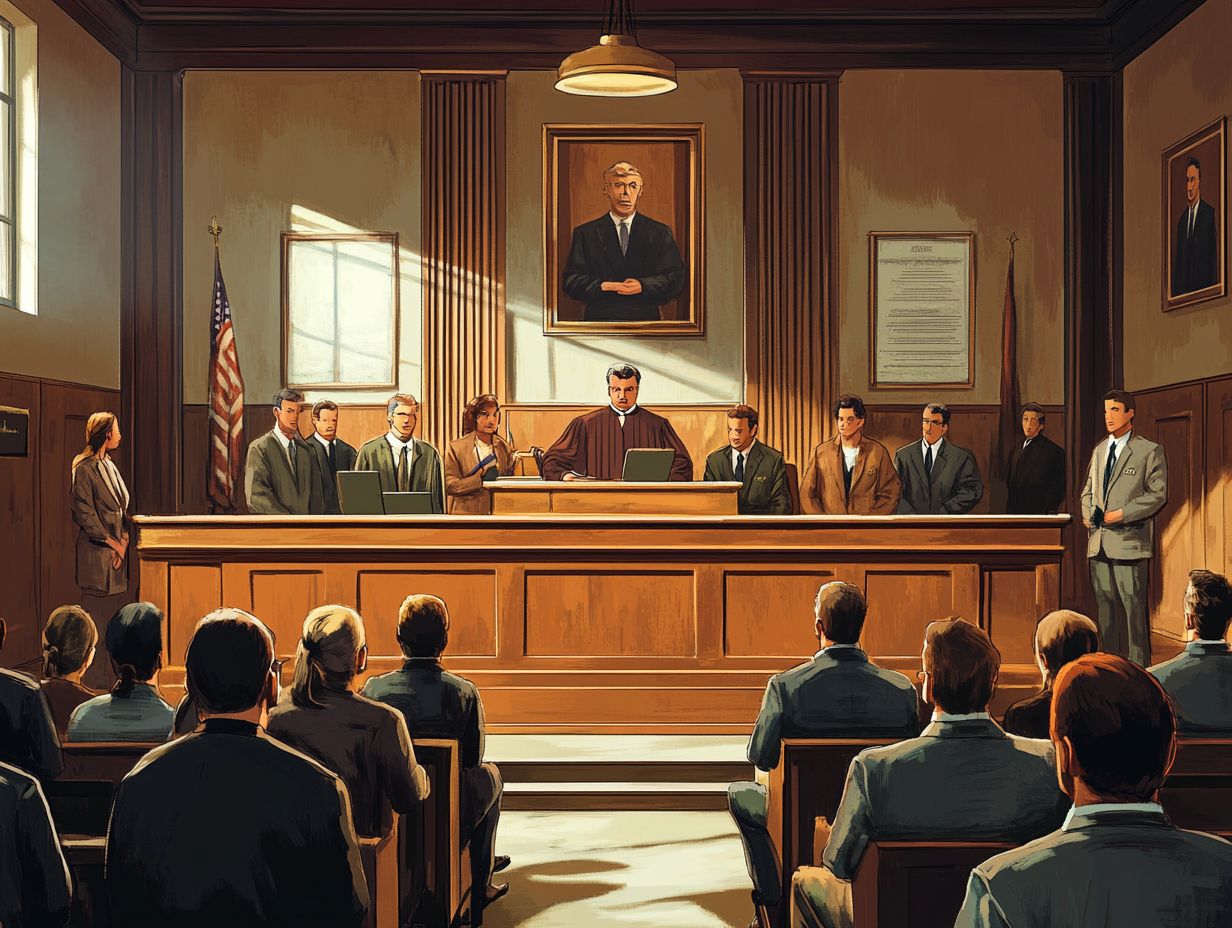
In a criminal trial, the jury’s verdict of guilty or not guilty hinges on the evidence presented and the legal instructions laid out by the judge. This crucial decision holds significant weight, influencing not only your immediate fate but also shaping broader perceptions within the criminal justice system.
A guilty verdict often leads to penalties such as imprisonment, fines, or community service. This serves as a means of accountability for you while delivering a degree of justice for the victim.
A not guilty verdict clears you of any wrongdoing, potentially restoring your reputation. However, it can also leave the victim feeling unheard or powerless.
Each outcome contributes to public sentiment about justice, sparking discussions about legal fairness, the effectiveness of evidence, and the overall integrity of the judicial process.
Sentencing and Appeals
After a guilty verdict, the sentencing phase kicks in to determine the appropriate punishment for the defendant. This phase is pivotal and leaves room for potential appeals that could challenge either the conviction or the decisions made during sentencing.
The court focuses not only on the crime but also on its serious impact on victims. They have the opportunity to share impact statements personal accounts revealing the emotional and psychological toll the offense has taken on their lives. These statements can significantly sway the judge’s decision, highlighting the human cost of the defendant’s actions.
Throughout the proceedings, the defendant’s rights are upheld to ensure they receive a fair hearing and can present any mitigating circumstances. If the defendant feels the sentence is unfair, they have the option to pursue an appeal process.
This allows their legal representatives to argue for a reassessment of either the conviction or the severity of the penalty, adding yet another layer of complexity to the already charged emotional landscape of sentencing.
What Witnesses and Victims Should Expect in a Trial
Witnesses and victims hold vital positions in a criminal trial, often confronting profound emotional hurdles as they prepare to testify and present evidence that can dramatically shape the trial’s outcome.
Testifying and Support Services
Testifying in a courtroom can feel incredibly daunting, but rest assured, there are numerous support services designed to guide you through the process and make sure your voice is heard loud and clear.
These services typically include counseling, legal assistance, and connections to advocacy groups that specialize in helping individuals navigate the intricacies of the judicial system.
By offering a safe environment and emotional support, these organizations empower you to share your account without the added weight of stress. The presence of trained professionals can significantly alleviate anxiety, encouraging you to engage actively in the trial.
Ultimately, your contributions are vital; they help illuminate the path to justice while ensuring you are supported at every step with tailored resources.
Frequently Asked Questions
What is a criminal trial?
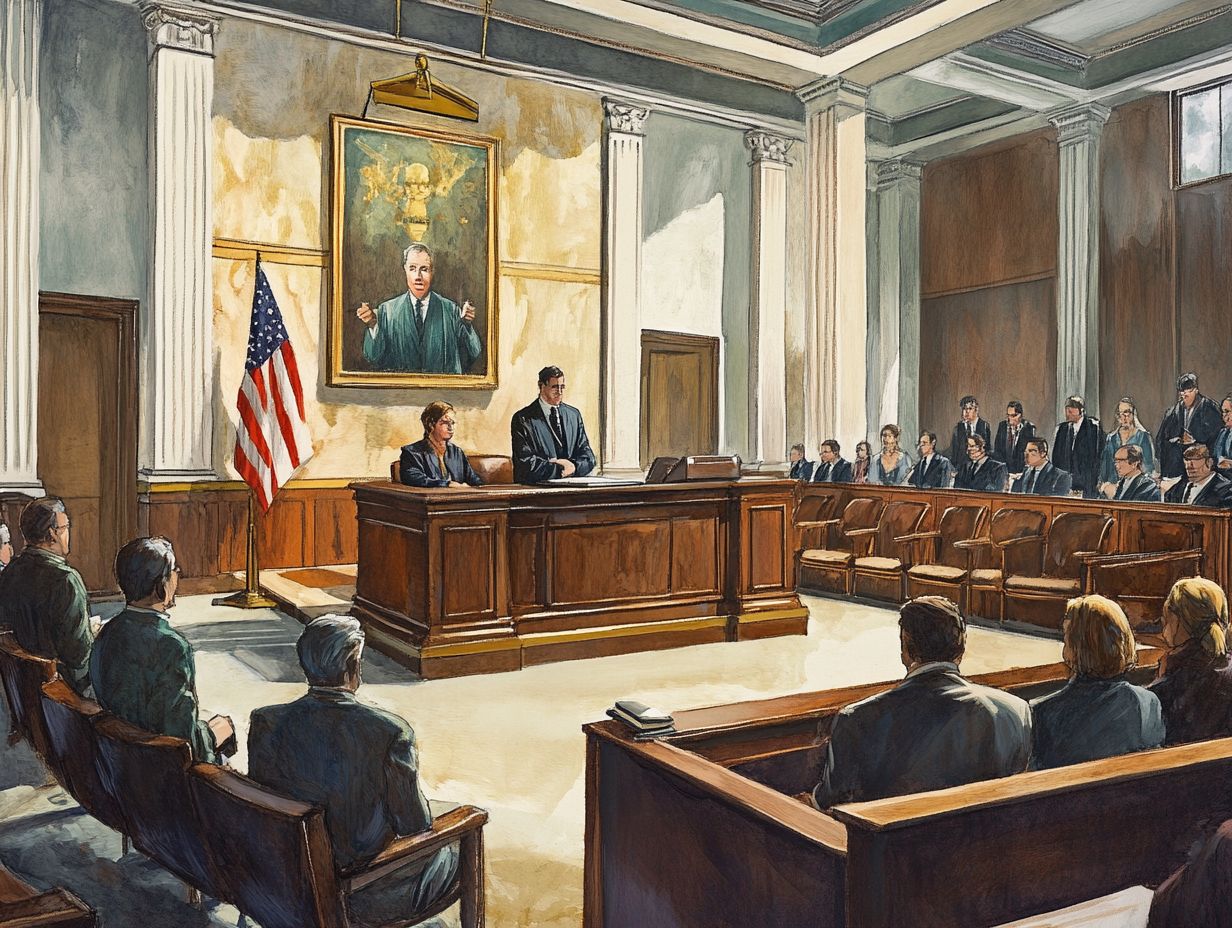
A criminal trial is a legal proceeding in which a person accused of committing a crime is brought to court to determine their guilt or innocence. It involves presenting evidence, examining witnesses, and arguments from both the prosecution and defense.
What happens during a criminal trial?
During a criminal trial, the prosecution presents their case against the defendant, including evidence and witness testimonies. The defense then presents their case, and both sides may cross-examine witnesses. The jury or judge then deliberates and makes a decision on the defendant’s guilt or innocence.
How long does a criminal trial typically last?
The duration of a criminal trial can vary depending on the complexity of the case, the number of witnesses and evidence presented, and other factors. Generally, a trial can last anywhere from a few days to several weeks or even months.
Do I have to attend my criminal trial?
If you are the defendant in a criminal trial, it is highly recommended that you attend all court proceedings. However, if you have a valid reason for not attending, such as illness or prior commitments, you may be able to have your lawyer represent you in court.
Will my criminal trial be open to the public?
Criminal trials are generally open to the public, meaning that anyone can attend and observe the proceedings. However, there may be certain circumstances, such as sensitive evidence or a minor victim, where the judge may close the trial to the public.
What happens if I am found guilty during a criminal trial?
If found guilty in a trial, the judge will determine your sentence. This may include jail time, fines, community service, or other penalties. Your lawyer can advise you on your options for appealing the verdict or seeking a reduced sentence.

